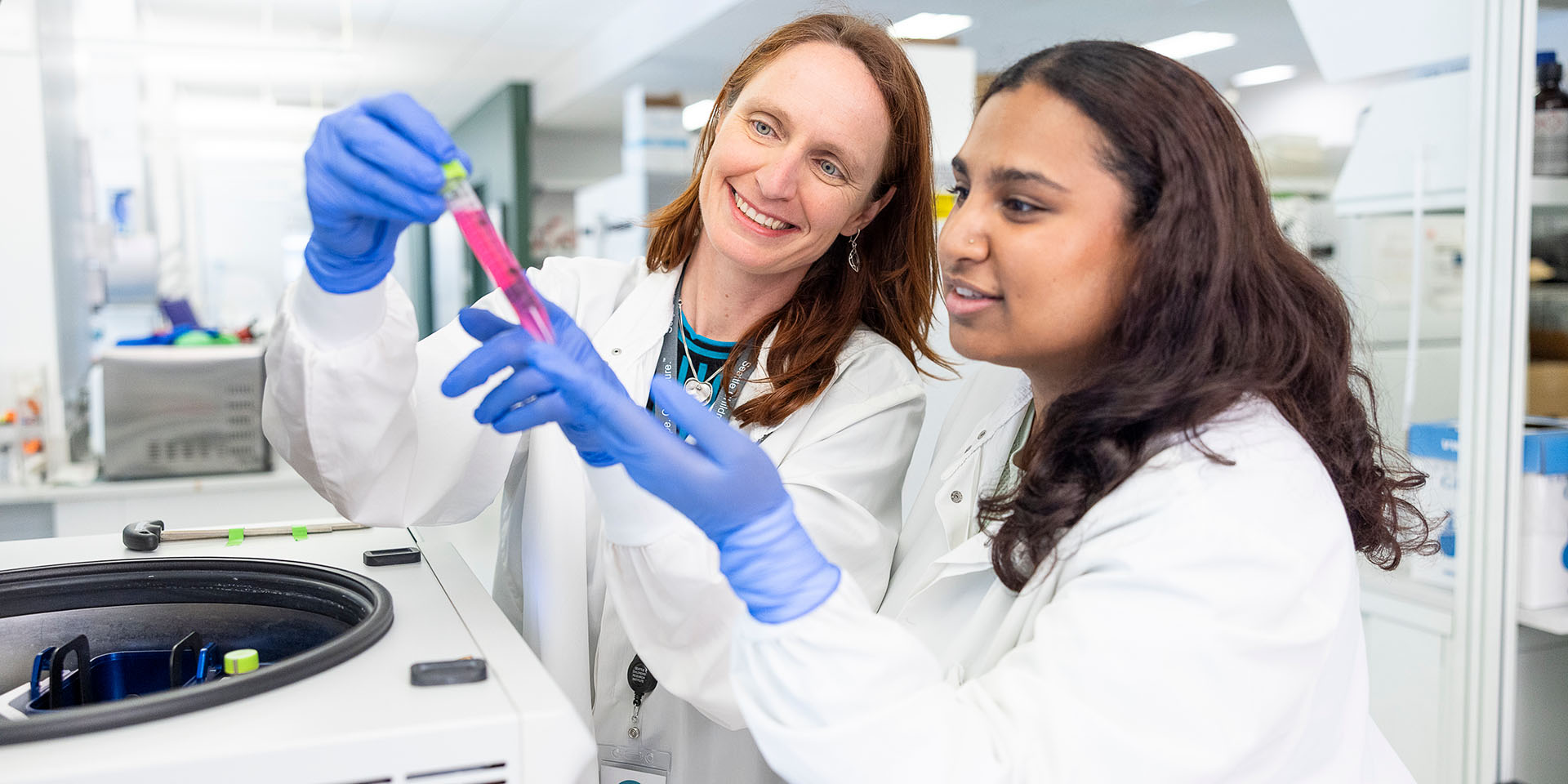Publication Q&A: Targeting Human Plasma Cells Using Regulated BCMA CAR T Cells Eliminates Circulating Antibodies
Published
Featured Researchers
 To treat disorders involving pathogenic antibodies, including lupus and organ transplant rejection, Seattle Children’s Research Institute scientists have developed a new type of cell-based medicine that can target and kill the plasma cells that secrete problematic antibodies. The therapy can be turned on or off for improved safety in patients.
To treat disorders involving pathogenic antibodies, including lupus and organ transplant rejection, Seattle Children’s Research Institute scientists have developed a new type of cell-based medicine that can target and kill the plasma cells that secrete problematic antibodies. The therapy can be turned on or off for improved safety in patients.
In healthy people, plasma cells orchestrate the immune response, defending against infection. However, the plasma cells can turn pathogenic in the context of immune disorders, such as lupus, type I diabetes and rheumatoid arthritis.
Patients awaiting solid organ transplantation often make anti-donor antibodies due to receiving so many transfusions, causing them to sit longer on donor lists due to incompatibility, and once they receive a transplant, the rejection risk is higher.
For this study, led by David Rawlings, MD, an immunologist and director of the research institute’s Center for Immunity and Immunotherapies, the researchers showed in a preclinical model that chimeric antigen receptor (CAR) T cells could seek out B cell maturation antigen (BCMA) to control pathogenic plasma cells. Additionally, they showed that dimerizing agent-regulated immune-receptor complex (DARIC) T cells, also targeted to BCMA, can be turned on and off with the medicine rapamycin so the plasma cells can be eliminated in a regulated way and the patient won’t lose all B cell response.
CAR T cell therapy is already showing great success in cancer care. These findings underscore the therapy’s potential in autoimmune and transplant medicine, too.
Children’s contributing authors: Yuchi Honaker, PhD, David Gruber, Chester Jacobs, Rene Cheng, PhD, Shivani Patel, Christopher Galvan, Iram Khan, PhD, Kevin Zhou, Karen Sommer, PhD, Peter Cook, PhD, Richard James, PhD, and David Rawlings, MD.
Read this article in the journal Molecular Therapy (published online Dec. 12, 2024).

Is this plasma cell research a first in any way?
Cell-based targeting of B cells to treat autoimmune conditions is a rapidly expanding arena with a range of new clinical approaches being evaluated. Our work provides the first demonstration of a regulatable T cell product that specifically targets antibody-secreting plasma cells.
What is the potential impact of this inducible CAR T cell research?
This research could provide a highly targeted and potentially safer treatment for antibody-mediated immune disorders, ranging from patients with donor-specific antibodies that are unable to receive an organ transplant, to patients with systemic autoimmune diseases like lupus. The ability to turn the BCMA-DARIC CAR T cells on or off after delivery will provide the ability to deplete existing plasma cells in patients awaiting a solid organ transplant. It could also provide new avenues for timing treatment to the flare and remission cycles associated with lupus and other autoimmune disorders. Our work also shows that BCMA-DARIC T cells could be an effective treatment for multiple myeloma, a type of blood cancer involving plasma cells.
What are the next steps and long-term goals for this BCMA-DARIC CAR T research?
We predict that BCMA-DARIC CAR T cells could be used to treat patients who need an organ transplant but have high levels of donor-specific antibodies that make it impossible to receive one due to rapid rejection caused by those antibodies. Treatment using BCMA-DARIC CAR T cells may allow such patients to move forward with organ transplantation and also help make it much less likely that the organ will be rejected over time.
Our work also suggests that BCMA-DARIC T cells might also be used as an “off-the-shelf” therapy for transient elimination of plasma cells. This would abolish the need to generate therapeutic cells from the patient’s own T cells, as is currently the case for CAR T cell therapy in the clinic. Such an approach could markedly reduce the cost associated with this therapy. Additional experiments will be required to test this concept.
With whom did you collaborate on this immunology research? Who supported the research?
This work was done in collaboration with the company 2seventy bio (now part of Regeneron) and highlights the work done at Seattle Children’s with biotechnology industry partners to push forward novel therapeutic technologies.
The research was supported in part by the Children’s Guild Association Endowed Chair in Pediatric Immunology and the Hansen Investigator in Pediatric Innovation Endowment, both to Dr. Rawlings.
Dr. Peter Cook on Exploring DARIC CAR T Cells for Autoimmune Indications
A Seattle Children’s Research Institute senior research scientist discusses preclinical work on using dimerizing agent-regulated immune-receptor complex T cells to target plasma cells.



